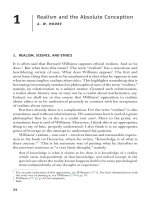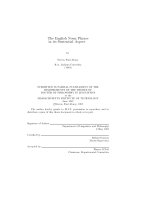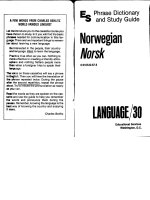Absolute phrase
Bạn đang xem bản rút gọn của tài liệu. Xem và tải ngay bản đầy đủ của tài liệu tại đây (7.97 KB, 1 trang )
Absolute phrase
When a participle and the noun that comes before it together forms an independent phrase, the structure is often
called an absolute phrase.
Examples of absolute phrases are given below.
Weather permitting we shall meet in the evening.
Here the phrase ‘weather permitting’ is an example of an absolute phrase.
God willing we shall meet again.
Here the phrase ‘God willing’ is an example of an absolute phrase.
More examples of absolute phrases are given below.
The weather being fine, we went out for a picnic.
The sun having risen, we set out on our journey.
Absolute phrases are used to combine two clauses that have different subjects.
Study the examples given below.
The visitors left. We went to bed.
Here the two sentences have different subjects. Still, we can combine them using a participle.
The visitors having left, we went to bed.
Another example is given below.
It was a stormy day. We stayed inside the house.
It being a stormy day, we stayed inside the house.
We can change an absolute phrase into a subordinate adverb clause of time, condition, cause or concession.
Weather permitting can be changed into ‘If weather permits…’
If weather permits, we shall meet in the meeting.
If God wills, we shall meet again.
As the weather was fine, we went out for a picnic.
After the sun had risen, we set out on our journey.
After the visitors had left, we went to bed.
Stay on top of your writing! Download our grammar guide from www.englishgrammar.org to stay up-to-date.
Powered by TCPDF (www.tcpdf.org)









